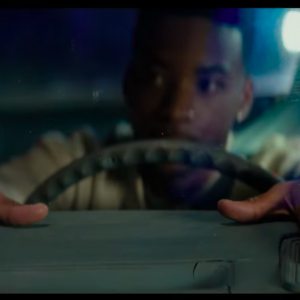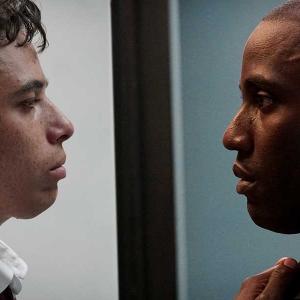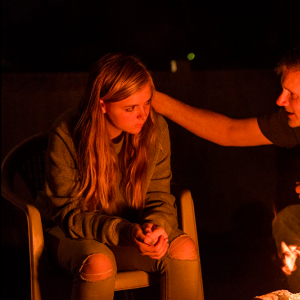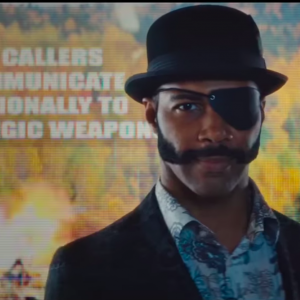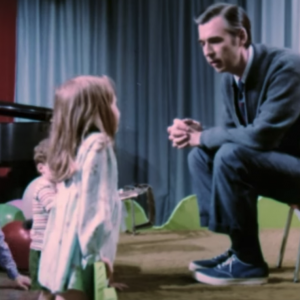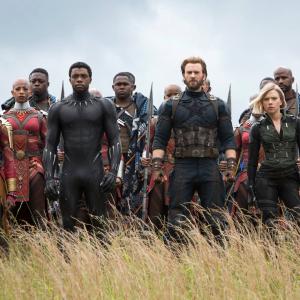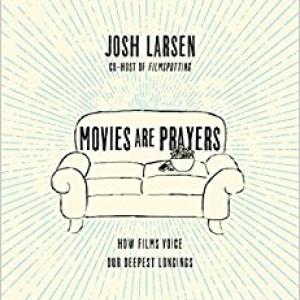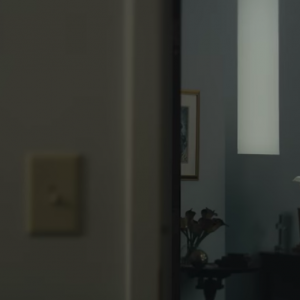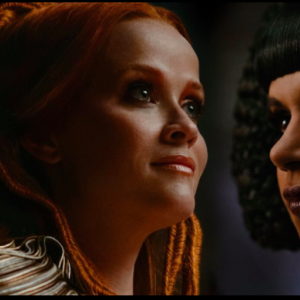
Abby Olcese (@abbyolcese) has been many things — a campus ministry leader at the University of Kansas, an English teacher in Prague, and an advertising assistant at Sojourners. These days, she’s a freelance writer based in Kansas.
Raised on a diet of Narnia, Bob Dylan records and Terry Gilliam movies, Abby is drawn to the weird, the nerdy, and the profoundly artsy corners of popular culture. She loves sharing this knowledge with others by writing about interesting new releases as well as lesser-known gems.
Abby is also passionate about the intersection of faith, social responsibility, and culture. She believes in the power of art to spark important conversations, inspire social change, and help people to better understand life in the kingdom of God.
When she’s not watching movies or writing things down, you can usually find Abby reading comic books or perusing the selection at her local record store.
Posts By This Author
Comic Book Myths Have a Place in Spiritual Growth

Cover of Wylde. Photo courtesy Cave Pictures Publishing on Facebook.
Myth-making is something the creative forces at Cave Pictures Publishing, a new comics publisher, are fascinated by. The publisher aims to use the medium’s possibilities in ways that bring together faith-oriented audiences who may be new to comics, and long-time fans of the medium looking for thematic depth. Wylde, a western-themed horror comic, is currently available on ComiXology. The Light Princess, an adaptation of the George MacDonald fairy tale, arrives in February.
'The Hate U Give' Is Exhausting Because It Should Be
For these characters, and for many black people in America, this is the way life is. Thomas’ novel won a plethora of praise and awards after its 2017 release for combining the social realities of life as a young black woman in contemporary America with a heartfelt coming-of-age narrative that resonated with a diverse array of readers. George Tillman Jr.’s film adaptation of the book, out now, admirably walks that same line. From every aspect, the film shows great respect for its source material, with an excellent script and stunning cast who clearly care about the story they’re telling.
'The Front Runner' Dulls Its Own Message by Refusing to Commit to a Perspective
To his credit, Reitman tries to humanize the characters on all sides of the issue, in an attempt to cast some shades of gray. It’s an admirable idea, but the lack of commitment to a particular perspective sinks the film. It also goes pretty easy on Hart, and one gets the sense that Reitman and his co-writers Matt Bai and Jay Carson (themselves experienced both in running campaigns and political reporting) seem to think it’s a real shame that media scandal tanked a campaign that could have done some real good. That may be, but it’s impossible to ignore that if Hart had stuck closer to the morals he claimed, there wouldn’t have been a scandal to report. Whatever good qualities he may have had, he’s just as guilty as the people who brought him down
'Monsters and Men' Takes a Multifaceted Approach to Police Brutality
Reinaldo Marcus Green’s film Monsters and Men is part of an interesting moment in popular culture. It’s one of four films this year to address the relationship between law enforcement and people of color. It’s also one of two movies playing at this years Toronto International Film Festival that deal directly with Black Lives Matter and the killing of black men by police officers.
Women Rally for More Inclusion at Toronto Film Festival
In that vein, the festival has made public strides to provide a platform for the issues faced by women in film, and to work toward promoting change. Thirty four percent of the films at this year’s festival come from female directors. As an organization, TIFF has made a five-year commitment to increasing opportunities for women in film by creating mentorships, skills development opportunities, and education initiatives. They’ve even expanded that commitment to women working in the media, with a push to invite female critics and reporters — as well as people of color — to cover the festival
'Standing on the Shoulders of the Sidney Poitiers and Spike Lees'
Sojourners spoke to Washington and Harrison about the dialogues the film encourages, what they learned while preparing for their roles, and how those experiences inform the actors’ perspectives on racial injustice and the relationship between police and people of color.
How Artists Are Using Comics to Tell Bible Stories
These comic book creators, and others like them, are drafting complicated, compelling narratives of Christianity that cut across today's expected divisions. Writers and artists who grew up with Christian backgrounds are finding inspiration in the stories and characters who marked them early on, and re-examining them with questioning minds.
‘Eighth Grade’ Reminds Us Of Our Need To Be Understood
Most of us who managed to survive middle school regard it as the most awkward time in our lives, when we cared deeply about how others see us, but were just as deeply unsure of how we saw ourselves. Eighth Grade uses that to tell a story about perception, one which applies to adults as much as it does to 13-year-olds. Burnham’s film explores how we want to be perceived by others, the harsh ways we perceive ourselves, and the way we’re perceived by those who see us fully, and love us unconditionally.
'Sorry to Bother You' Is Trippy Satire That Is Not Far From Reality
There’s a lot going on thematically in Sorry to Bother You. Cash has to deal with the indignity of trading success for being his authentic self. As an artist, Detroit also struggles with selling out —she, too, has a “white voice,” but instead of selling a product, she’s using it to sell herself. The news media covering the RegalView strike is addicted to easily-repeated clips rather than the whole story, as when a protester who throws a can of cola at Cash becomes famous when the incident goes viral. Our willingness to laugh at rather than empathize with the struggles of others is also displayed through a popular game show called “I Got the S**t Kicked Out of Me,” where contestants get beaten up and dunked in excrement.
The Enduring Kindness of Mister Rogers
Yes, goodness and altruism in others may seem rare. But the importance of Won’t You Be My Neighbor? lies in showing us that it’s not impossible, and may be easier to generate than we think.
'Tully,' Parenthood, and Allowing Ourselves to Ask for Care
Tully is a real, funny, unflinching look at the demands of parenthood. It shows the pressures of outside judgment, and constant frustration, as well as the small moments of beauty and victory when everything works, and we’re buoyed by the kindness and care of others. It also shows what happens in the absence of that care, or our unwillingness to recognize how much we need it.
What ‘Avengers: Infinity War’ Teaches Us About Uncertainty, Loss, and Sacrifice
Previous Avengers movies were about the challenges of building and sustaining and a community. Infinity War is a sobering reminder that even the biggest, strongest communities sometimes face adversity that results in sacrifice, uncertainty and loss. This is the MCU’s equivalent of C.S. Lewis’ The Last Battle, gathering characters both beloved and new, and throwing them into a brutal endgame. It’s a Good Friday movie, too, putting those left standing at the end into their own version of Gethsemane.
Same Beauty Norms, Barely Re-Packaged

Image via ifeelpretty.movie.
I Feel Pretty is mainly a superficial enterprise. There are plenty of opportunities for smart satire here, but co-writers and directors Abby Kohn and Marc Silverstein stick to a simplistic interpretation — one that claims to push for female empowerment, but still remains concerned with looks and a pretty narrow definition of beauty norms.
Unafraid of Hard Questions
IT’S A WEDNESDAY night in early November and the sanctuary of Redemption Church in Olathe, Kan., is full. The audience, mostly 20- and 30-somethings, is listening in rapt attention to Mike McHargue, better known as Science Mike. Self-proclaimed science enthusiast McHargue, co-host (with musician and songwriter Michael Gungor) of The Liturgists Podcast, is doing a live episode of his solo side podcast, Ask Science Mike, as part of a tour for his new book, Finding God in the Waves.
After questions ranging from the neurological effect of belief on the brain to the role of women in the church, a young man stands and shares his story. He works at a conservative church, he says, and finds his beliefs are starting to differ from the people he works with. Finally, he asks, “When you start to ask big questions, and you don’t know where they’re going, and you don’t know where they’ll take you, how do you find the courage to continue to move forward when you know it might have dramatic consequences?”
“I have terrible news,” McHargue answers. “If this continues, you will not fit in where you are. How do I know? There are a thousand people at a Baptist church, who I love dearly, who could not stand to be in a room with me, because I’m the one who rebelled against the tribe.” He pauses a moment before continuing. “Here’s the other thing. This is good. The way you understood God, that served you for so long, isn’t working anymore because you’re growing. ... So I say, get excited.”
McHargue and his Liturgists Podcast co-host Gungor are no strangers to questions about belief, doubt, and straying from the theological tribe. Both men grew up in conservative evangelical churches, and both men lost their faith as adults, regaining it in a different form later on. It’s an experience familiar to plenty of the millennials and Gen-Xers who make up the “nones,” the growing portion of the U.S. population who have no religious affiliation.
Finding God in the Dark
AS A TEENAGER growing up in a church setting that discouraged engaging with movies, books, or music deemed a “bad influence,” I remember frequently being confused about pop culture, particularly when it came to what films I was “allowed” to watch. Was I wrong for wanting to see Taxi Driver ? For identifying with Saved? Was it a sin to watch The Last Temptation of Christ?
The answer to all these questions, of course, is “no,” but the sentiment behind them is understandable. The easiest metric for Christians to judge a film’s quality is the measure of its “objectionable” content, regardless of what that content says about the filmmaker’s intent, or the political or cultural attitudes under which it was conceived. The truth, however, is that all art—whether spiritual or secular in origin—has something to express about the world: joy in its beauty, anger at its injustice, a whole spectrum of emotions and ideas that reflect the human experience.
'Come Sunday' Asks What Happens When Faith Changes
Sometimes, the film tells us, there are no good answers. All we can do is sit with our thoughts and do our best to love each other well.
‘Ready Player One’ Confuses Meaningful Nostalgia with Legalistic Knowledge
Unfortunately, that’s not a sentiment shared by the rest of the film. In their quest, Wade and his friends display their encyclopedic knowledge of vintage pop culture as badges to be worn, or tools to be used, rather than pieces of personal meaning. At one point, Sorrento meets with Wade to try and win him over, spouting references fed to him by a lackey in another room. Wade calls his bluff, telling his enemy, “A fanboy knows a hater.” But it’s hard to see much of a difference between the two characters in that moment. They’re both using rote, memorized facts, rather than actual connection, to fuel their conversation and get what they want. The only difference is that Wade had to do the research on his own, while Sorrento has a team doing it for him.
The Message of 'Love, Simon': We All Deserve a Great Love Story
Robinson’s performance as Simon is worth noting in the way it adheres to and subverts teen movie characters we’ve seen before, with particular regard to the master of the genre, John Hughes. Robinson’s got all the charm, looks, and outward swagger of a Hughes leading man, with the inner confusion and insecurity of Molly Ringwald, all rolled into one. He’s the rare effortlessly cool movie teen who doesn’t have it all figured out. And his friends are honest about their own issues, too, providing a refreshing portrait of movie teenagers that hits closer to reality.
A Wrinkle in Time: A Beautiful, But Surface-Level, Film
A Wrinkle in Time is bright and colorful, not only applying broad imagination to its settings and costumes, but also daring to extend that same concept to its diverse cast. In addition to the multiracial identities of the three Mrs., Meg is biracial and the adopted Charles Wallace is asian. These choices clearly come from a very personal place for DuVernay, and it’s lovely to see that diversity communicated with earnestness and intention. A large part of the film’s message is self awareness and self-love and it’s important that this message comes to audiences through the experience of a young girl of color, addressing universal pre-teen feelings of awkwardness or self esteem issues through a character who relates to more than just a white audience.
Welcome to Wakanda
Should we be building walls, or making it easier for people seeking a better life to enter our borders? Should we use our resources to exercise military might, or to fix a system rigged against people of color and people in poverty? Wakanda knows its answer. Perhaps Black Panther can help American audiences reconsider ours.
